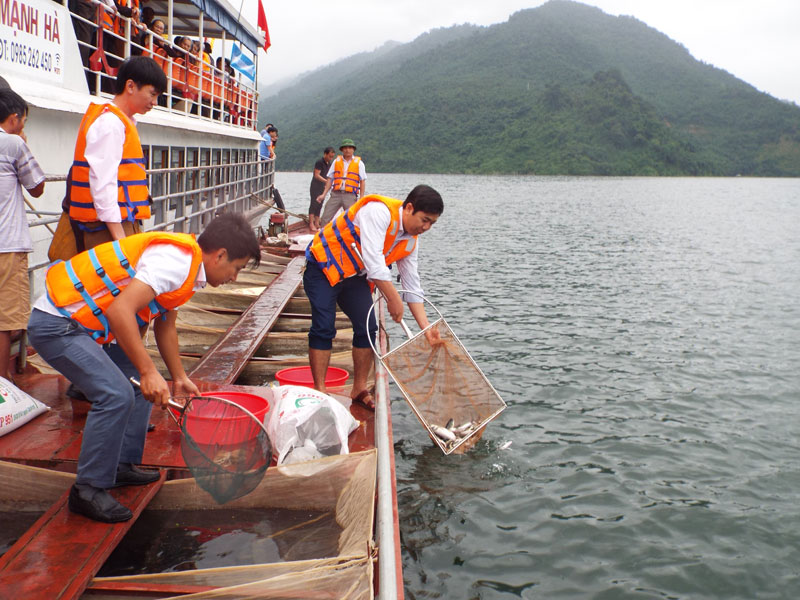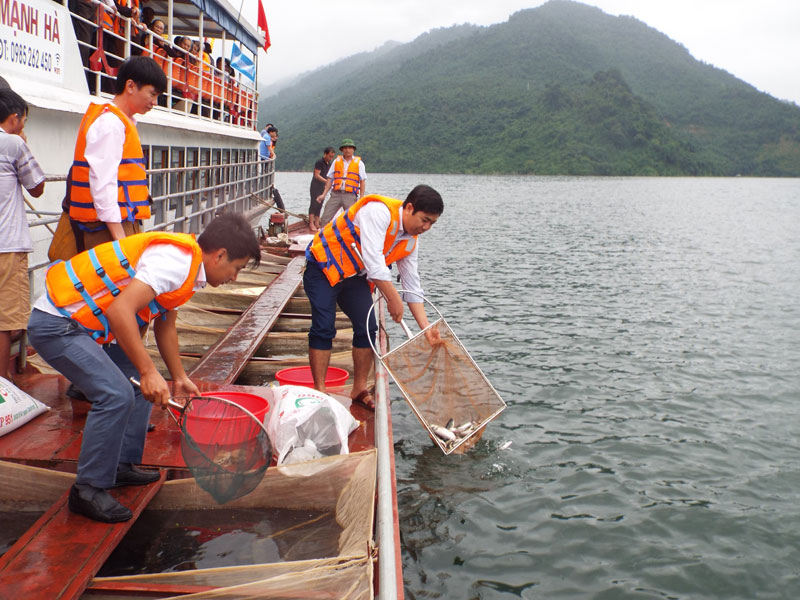
(HBO) – A recent ceremony to release fishes to Hoa Binh reservoir has drawn a large number of Buddhist monks, nuns and followers as well as the local administration and management agencies. The release, funded by businesses, monks, nuns and followers, sees over 60,000 fingerlings of different kinds swimming into the lake.

Organisations join the activity of
releasing fishes to develop aquatic resources in Da River.
Covering a total area of 8,892 hectares, Hoa Binh Reservoir
in Hoa Binh province is considered as a precious source of aquatic species of the
northwestern region with many valuable fish species such as "chien” (Bagarius
bagarius), "bong” (Spinibarbus denticulatus), "lang” (Bagridae), "dam xanh”
(Kyphosidae), "anh vu” (Semilabeo notabilis), and many others.
Aquaculture has helped thousands of local families
reduce poverty and improve their living conditions.
Localities along the banks of the lake have launched a
number of communications activities to protect and develop aquatic resources sustainably,
creating chances for poverty reduction.
Dinh Van Huy, Vice Chairman of the People’s Committee
of Hien Luong commune (Da Bac), said that the commune has about 900 hectares of
water area. Over the past many years, the commune has paid great attention to
improving public awareness in implementing the Law on Fisheries, reducing and
preventing the use of electricity pulse and gill net in fishing activities, and
developing the fish farming in line with the planning.
Locals have also applied science and technology
advances in disease management and fish farming to safety standards, thus
opening an effective orientation in lake-based economic development.
In recent years, the province has maintained the
activity of releasing fishes to the lake to enrich the aquatic resources and
enhancing the awareness of organisations, individuals and the public on the
significance and responsibilities in protecting aquatic resources.
The province has implemented aquaculture in line with
environmental protection, prohibiting the use of explosives, toxic chemicals
and electricity pulse in fishing, while actively enriching the aquatic
resources, managing species, improving public awareness of the resources
management and protection.
The releasing of fishes into the Hoa Binh Reservoir helps
reproduce and preserve the biodiversity to create positive impact on the public
and enhance the awareness of Buddhist monks, nuns and followers as well as
locals in safeguarding aquatic resources./.
According to data from the Hoa Binh Provincial Party Committee, the industrial production index for the first six months of 2025 is estimated to have increased by 20% compared to the same period last year. This marks the highest year-on-year growth rate for this period since 2020.
In the first six months of 2025, Hoa Binh province’s export turnover was estimated at 1.145 billion USD, marking an 18.11% increase compared to the same period in 2024. Import turnover was estimated at $ 804 million, a 17.15% increase, which helped the province maintain a positive trade balance.
The lives of the ethnic minority farmers in Tan Lac district have gradually improved thanks to the new directions in agricultural production. This is a testament to the collective strength fostered through the professional associations and groups implemented by various levels of the district’s Farmers’ Union.
With the motto the "product quality comes first,” after nearly one year of establishment and operation, Muong village’s Clean Food Agricultural and Commercial Cooperative, located in Cau Hamlet, Hung Son Commune (Kim Boi district), has launched reputable, high-quality agricultural products to the market that are well-received by consumers. The products such as Muong village’s pork sausage, salt-cured chicken, and salt-cured pork hocks have gradually carved out a place in the market and they are on the path to obtaining the OCOP certification.
In the past, the phrase "bumper harvest, rock-bottom prices" was a familiar refrain for Vietnamese farmers engaged in fragmented, small-scale agriculture. But today, a new spirit is emerging across rural areas of Hoa Binh province - one of collaboration, organisation, and collective economic models that provide a stable foundation for production.
Maintaining growing area codes and packing facility codes in accordance with regulations is a mandatory requirement for agricultural products to be eligible for export. Recently, the Department of Agriculture and Environment of Hoa Binh province has intensified technical supervision of designated farming areas and packing facilities to safeguard the "green passport" that enables its products to access international markets.



